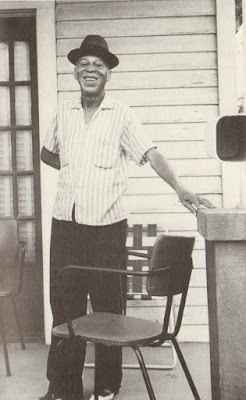Isidore "Tuts" Washington (January 24, 1907 –
August 5, 1984) was an American blues pianist from New Orleans, Louisiana who
was a primary influence on later Crescent City players spanning from Professor
Longhair and Allen Toussaint to Fats Domino.
itinerant New Orleans musician Joseph Louis "Red" Cayou,
Washington amassed a vast repertoire of songs by memorizing performances by
area brass bands, then quickly returning home to develop his own renditions.
Recognized as something of a prodigy, Washington -- also
known as "Papa Yellow" -- was already the superior of most local
barrelhouse pianists by his teen years, and he regularly sat in with prominent
Dixieland and society bands; his style brought together an eclectic mix of
ragtime, jazz, and blues textures, and despite a general reliance on
instrumentals, he was also known to pull the occasionally bawdy vocal number
out of his bag of tricks.
After World War II, Washington joined Smiley Lewis in a trio
with drummer Herman Seals. Prior to the 1952 breakup, they cut some of the
landmark New Orleans R&B sides of the period for Imperial, among them
"Tee-Nah-Nah," "The Bells Are Ringing," and "Dirty
People."
However, for the most part, Washington considered recording
of little consequence, content instead in his standing as the consensus choice
as the French Quarter's champion pianist; as a result, he regularly rejected
offers to cut solo sides, and in 1950 set out to conquer new territories,
relocating to St. Louis to join the Tab Smith Orchestra.
Here's "Tee-Nah-Nah" from above album.
He was back in New Orleans by the end of the decade, performing
in restaurants in the French Quarter in clubs such as Tipitina's and at the New
Orleans Jazz & Heritage Festival. He signed on with the Clyde Kerr
Orchestra and added a new pop-oriented dimension to his playing for the sake of
tourists.
 He also frequently played on the Mississippi River on the Delta Queen
whilst continuing to perform at various musical landmarks in New Orleans such
as the Court of Two Sisters Restaurant in the French Quarter, and the piano bar
at the Caribbean Room of the Pontchartrain Hotel.
He also frequently played on the Mississippi River on the Delta Queen
whilst continuing to perform at various musical landmarks in New Orleans such
as the Court of Two Sisters Restaurant in the French Quarter, and the piano bar
at the Caribbean Room of the Pontchartrain Hotel.
 He also frequently played on the Mississippi River on the Delta Queen
whilst continuing to perform at various musical landmarks in New Orleans such
as the Court of Two Sisters Restaurant in the French Quarter, and the piano bar
at the Caribbean Room of the Pontchartrain Hotel.
He also frequently played on the Mississippi River on the Delta Queen
whilst continuing to perform at various musical landmarks in New Orleans such
as the Court of Two Sisters Restaurant in the French Quarter, and the piano bar
at the Caribbean Room of the Pontchartrain Hotel.
He avoided recording for most of his career, but he released
the solo piano album New Orleans Piano Professor for Rounder in 1983. A live
recording by Washington, Live at Tipitina's '78, was released by Night Train
International Records in 1998.
Washington died on August 5, 1984, after having a heart
attack while performing at the World's Fair in New Orleans.
(Compiled and edited from Wikipedia, AllMusic, the Blues
Trail.com)






2 comments:
For “Tuts Washington - New Orleans Piano Professor” go here:
https://www.upload.ee/files/9468841/Tuts_Washington.rar.html
1 When The Saints Go Marching In 1:54
2 Tin Roof Blues 4:03
3 Arkansas Blues 3:08
4 Do You Know What It Means To Miss New Orleans 2:43
5 Honky Tonk 3:20
6 Wolverine Blues 2:38
7 On The Sunny Side Of The Street 2:26
8 Jambalaya 1:22
9 Misty 3:03
10 Mr. Freddie Blues 2:44
11 Stardust 3:45
12 Frankie And Johnny 2:18
13 Hattie Rogers Blues 1:57
14 Georgia On My Mind 2:20
15 Tee Nah Nah 1:54
16 White Christmas 2:37
17 Forty-Four Blues 1:59
18 Blue Moon 2:23
19 Yancey Special 4:35
20 Tipitina 2:16
21 Cherry Pink & Apple Blossom White 0:54
22 Santa Fe Blues 3:33
23 Papa Yellow Blues 1:56
Venerable New Orleans pianist Tuts Washington didn't get many chances to record during his lifetime. This 1983 session, was his most extensive project, with 23 songs covering everything from spirituals to traditional jazz numbers, pop pieces, novelty tunes, blues, and country. Washington played them all in a seamless manner, displaying the mix of boogie-woogie and barrelhouse riffs, R&B, blues, and gospel elements, Afro-Latin and Caribbean rhythmic accents, and jazz phrasing and licks mastered through many decades of playing in bars and clubs. This was his chance in the spotlight, and Washington didn't waste it. (Review by Ron Wynn @ All Music)
A big thank you to Egroj @ Egroj World for original post.
great piano blues !
regards!
Post a Comment